I like Russell Edson A Lot
 Russell Edson is really old. He was born in 1935. I like a lot of things about Russell Edson but one thing his writing is not, is old. His stuff is always really fresh and modern, full of sadness and amazing images. Sometimes you read writers who really inspire you to write. When I read Russell Edson I don’t feel like writing because he’s already done it.
Russell Edson is really old. He was born in 1935. I like a lot of things about Russell Edson but one thing his writing is not, is old. His stuff is always really fresh and modern, full of sadness and amazing images. Sometimes you read writers who really inspire you to write. When I read Russell Edson I don’t feel like writing because he’s already done it.
Russell Edson is having fun when he writes. In an interview he said, “I have no formal background, as you suggest, in anything. I just make up things as I go along without a program. It’s more fun that way.”
What I like is that his writing is really strange, but branching off the strangness is dozens of feelings. I think strange writing or surreal writing has to be done well. I read lots of stuff that is strange, but that’s all it is. It’s just fucked up with no where to go.
I really like this poem by Russell Edson. Every time I read it I love it more. I want to live in this poem. I want to meet the Closet-Man. I can feel and taste this poem and it’s dreamy and mysterious and it’s a shape and it’s wonderful.
THE REASON WHY THE
CLOSET-MAN IS NEVER SADThis is the house of the closet-man. There are no rooms, just hallways and closets.
Things happen in rooms. He does not like things to happen.
… Closets, you take things out of closets, you put things into closets, and nothing happens…
Why do you have such a strange house?
I am the closet-man, I am either going or coming, and I am never sad.
But why do you have such a strange house?
I am never sad…
Ounce of Pound: Grad School Edition
In the main I don’t see that teaching can do much more than expose counterfeit work, thus gradually leading the student to the valid. The hoax, the sham, the falsification become so habitual that they pass unnoticed; all this is fit matter for education. The student can in this field profit by his instructor’s experience. The natural destructivity of the young can function to advantage: excitement of the chase, the fun of detection could under favorable circumstances enliven the study.
Whereas it is only maturer patience that can sweep aside a writer’s honest error, and overlook unaccomplished clumsiness or outlandishness or old-fashionedness, for the sake of the solid centre.
-ABC of Reading, p. 193
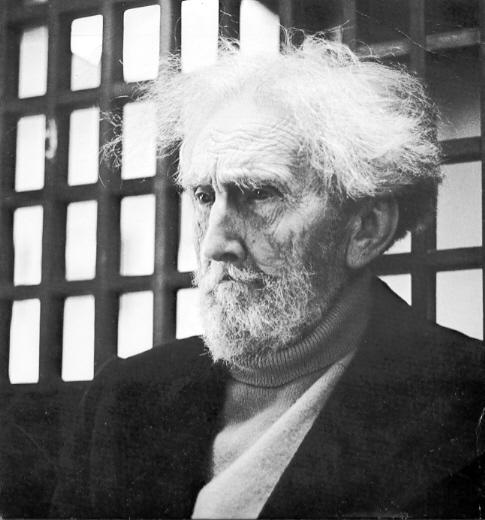
****SPECIAL EZRA POUND COMPARATIVE LIT BONUS FEATURE*****
When was the last time you read “Visits to St. Elizabeth’s” by Elizabeth Bishop, about going to see Pound when he was institutionalized? Probably a long time, right? Let’s refresh our memories:
And poets.org has the actual poem here. Try reading it out loud.

I like Haruki Murakami a lot
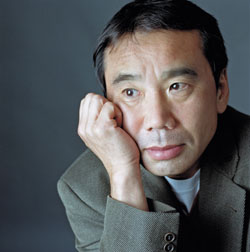
First off, I do think Murakami is over-rated, but that doesn’t mean he’s not good. I only like two of his books, but I like them immensely: Wind-up bird Chronicle and Kafka on the Shore. His ideas are sometimes corny, but overall I think he’s onto something.
His other books, especially the ones like Norwegian Wood where he goes on about Jazz and girls, I think is stupid—like he’s trying to be F. Scott Fitzgerald, sentimental or even self-satisfied about his lifestyle.
I much more like it when Murakami tries to be Pynchon or Borges. I say ‘tries to be’ because I think Murakami is not original, but he takes existing ideas or methods about/in fiction and his mark is his ability to make it seem like he invented the style. At the same time, he’s not trying to be post-modern the way Delillo tries, or Barth tried. His style is re-appropriation and the audacity to not be ironic about it. He’s an ‘earnest original fraud,’ and I like him a lot.
WUBC starts off with a guy making spaghetti and listening to the radio when the phone rings. I’ve read that part over many, many times and I don’t understand how he did it, but that scene is just as grotesque as Gregor Samsa waking up as a bug. It’s like there’s something ‘wrong’ with the scene. Murakami’s genius is his ability to evoke feelings that are completely uncorrelated with the actual printed words. His novels ‘happen’ outside the words.
KOTS uses alternating chapters to describe two narratives, which is gimmicky I know, but he handles it very well. Near the middle of the book I said, “wait a minute — this is the same story, merely synopated,” that the odd chapters somehow melded into the chasms introduced in the even chapters. It was like entropy: a closed system with two parts, each of which began permeating into the other. I’m usually skeptical about the device of ‘dreams’ in fiction, but KOTS was itself a dream — like the logic was not rational yet made sense, the way we accept random images in our dreams. It lacks Gaddis’s intricacy, but is yet is formally resolved. Murakami, at his best, transcends the formal constraints of time, lineage, narrative, character, etc. His books are dreams that make sense, while not relying on ‘dreams’ to resolve the formal disparities. I can’t describe how he does it, it’s just Murakami.
Whenever I want to be confused and feel like there are Japanese people everywhere, I either go to Japantown or read Murakami. I like him a lot.
Hagakure: Hidden among the shadows of leaves
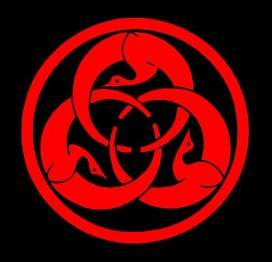 The Hagakure is a samurai doctrine written by Tsunetomo Yamamoto near the end of his life. The text originally was kept alive within small samurai clans and later became the defacto warrior philosophy text of Japan. The kamikaze pilots of Pearl Harbor were gifted a handwritten version of the text during the ceremonies of their death mission.
The Hagakure is a samurai doctrine written by Tsunetomo Yamamoto near the end of his life. The text originally was kept alive within small samurai clans and later became the defacto warrior philosophy text of Japan. The kamikaze pilots of Pearl Harbor were gifted a handwritten version of the text during the ceremonies of their death mission.
Here are some excerpts:
A certain swordsman in his declining years said the following:
In one’s life. there are levels in the pursuit of study. In the lowest level, a person studies but nothing comes of it, and
he feels that both he and others are unskillful. At this point he is worthless. In the middle level he is still useless but is
aware of his own insufficiencies and can also see the insufficiencies of others. In a higher level he has pride
concerning his own ability, rejoices in praise from others, and laments the lack of ability in his fellows. This man has
worth. In the highest level a man has the look of knowing nothing .
These are the levels in general;. But there is one transcending level, and this is the most excellent of all. This person is
aware of the endlessness of entering deeply into a certain Way arid never thinks of himself as having finished. He
truly knows his own insufficiencies and never in his whole life thinks that he has succeeded. He has no thoughts of
pride but with self-abasement knows the Way to the end. It is said that Master Yagyu once remarked, “I do not know
the way to defeat others, but the way to defeat myself. ”
Throughout your life advance daily, becoming more skillful than yesterday, more skillful than today. This is neverending.
All Points Bulletin: Mother Giant looks out for its Young
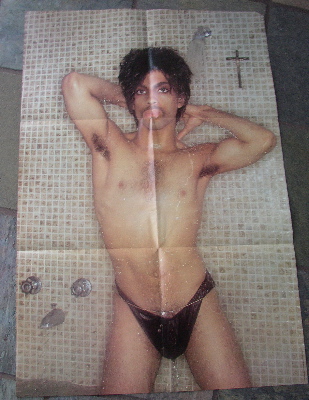
Rock. Star.
Friends, our own Mike Young NEEDS YOUR HELP! His essay “It Ain’t Me, Babe” is in the running for Best Nerve.com Feature of 2008. The competition is fierce. Right now Rachel Shukert’s essay about spending the night in a crappy lovenest in Nebraska is in the lead, with some bullshit about Stuff White People Like trailing not far behind it, but as you’ll see when you go over there, the vote-count is pretty low across the board so a decent influx of GIANT voters could seriously tip things Mike’s way. Also, FYI, you can only vote for each essay once, but you are allowed to vote for more than one essay.
I also gave a vote to “Triangulation” by Caitlin Macrae. It’s a piece about threesomes. She seems to really hit the nail on the head about what makes them so alluring, and she seems to like them even more than I do, which is seriously saying something.

Bonus points if you get this reference.
Swink is back
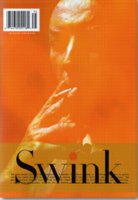 It’s been a long while since we heard anything from Swink. They came out of the gates huge and killed everything in 3 issues, then entered a long, I can’t even remember how many year, period of blank, in which their fate seemed to be belly up.
It’s been a long while since we heard anything from Swink. They came out of the gates huge and killed everything in 3 issues, then entered a long, I can’t even remember how many year, period of blank, in which their fate seemed to be belly up.
Well, as of this week I think, they have returned with a brand new website, and a new all-digital format. I am really glad to see them back.
Their reincarnation contains the 6-pronged strand of publishings including: fiction, poetry, and essay, plus three Swink original departments: Dead Letter Office, Wit’s End, and You are Here.
Go check out the site to see what’s up. Their subs are also open, and electronic.
Currently you can read work by Greg Ames, Brian Oliu, Edith Pearlman, Ann Cummins, and a ton more.
This is exciting. Welcome back Swink.
December 10th, 2008 / 2:51 pm
2 Recordings of Flannery O’Connor Reading Her Work!
This comes with a tripple hat-tip, and proves why the internet is awesome.
1) Did you know I have the same name as a somewhat famous preacher? That’s right. Justin Taylor of Wheaton, Illinois, who blogs at Between Two Worlds and is the author and/or editor of several books, including Overcoming Sin and Temptation, Communion with the Triune God, The Supremacy of Christ in a Postmodern World, and Where Did Christianity Come From? I often wonder if he knows I exist. I mean, if he searches his own name on Amazon, he’ll get my anthology The Apocalypse Reader, as his #3 response, right between Communion with and Supremacy of.
Friends: In Which People Who Don’t Know Eachother Try to Get Along

Perennial provocateur and imminent instigator P.H. Madore, has written A Wordless Threat of Kung Fu Reprisal, featuring Htmlgiant contributors and other likely lit world suspects.
An exceprt:
Ken Baumann struck the bartender called J. K. very hard with a dead fish he’d had wrapped in recycled chapbooks specifically for such an occasion. The bartender dropped the champagne bottle. Jackie Corley shrieked and said, “Fuck this, I’m getting back to work!” Nick Antosca smiled. Ken Baumann said, “No posit, no colony, motherfuckers!”
Mmm…I wonder if J.K. stands for ‘just kidding.’
Personally, I welcome such satirical takes on me, and hope — god I hope — others feel the same about them.
P.H. Madore is off to Iraq soon, so be nice. Gawd bless you Madore, and Amerika.
Word Spaces (1): David Gianatasio
Today we’re kicking off a new feature at the Giant, WORD SPACES, which will consist of authors talking about where they work when they are writing and how the space affects their work, etc.
To kick it off we have David Gianatasio, the author of MIND GAMES, just out from Word Riot Press. (also the author of SWIFT KICKS from So New Media). He is a longtime fixture in online and independent lit and a really good guy.
Here is a piece from the book at Alice Blue Review.
And here is where David writes:

David's writing area, cozy.
My workspace is a small hallway — the entryway, really — of my apartment. It’s a very nice apartment — you can’t really see how nice it is from the picture/s. The hallway is the most cluttered & cramped area by far.
Why write in a hallway? Well, that’s where I keep the computer. It’s a laptop with a WiFi card so I could write anyplace in the apartment. But then I wouldn’t be in the hallway. You see what I mean.
The computer’s on an old bar filled with old VHS tapes I never watch. I’ll stick my hand in and pull one out at random. Godzilla vs. The Thing. Classic.
Maybe it’s symbolic. The entryway to my home holding the doors of perception, the gateway to other times & places, unlocking the secrets of soul & mind.
I was really reaching there. Sorry. Next film … Columbo: Prescription Murder. In Columbo, they showed you whodunnit in the opening scene. I always found that reassuring.
The smoke and carbon detectors are right above my head when I work. More than once, they’ve gone off in a shrill and nerve-shredding fashion, causing me to squeal like a girl and stand up suddenly, knocking my computer to the floor. Also when my wife comes home, she opens the door and knocks me off my chair.
There’s a photo of me as a 7 year old to the right of the computer, above the printer. Sometimes, when I’ve written something really good (like my new book, MIND GAMES from Word Riot Press!) or remembered my login for PayPal, I turn to that picture and say: “Way to go, little guy!”
I should probably stop doing that.
I’m going to reach in for one last tape …
I was hoping it was a Barney the Dinosaur (I know there’s one in there), or something racy so I could say: “Whoa, that’s a naughty one!” But in fact I pulled out a blank unused cassette. Empty … waiting for content. Will it ever reach its potential?
Given the theme of this piece, I think that says it all.
And really, how do you even know for sure there are tapes in these? Maybe I use it to store cheese. And if I do … well … I should probably stop doing that.
Look out for more of this feature with some really awesome people coming up, hopefully weekly for Wednesdays…


